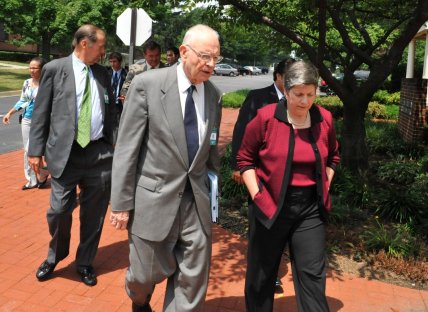Empower the Director of National Intelligence, 9-11 Co-Chairs Tell White House
The former co-chairs of the 9-11 Commission today called on President Barack Obama to empower the Director of National Intelligence (DNI) to force information-sharing within the intelligence community (IC) and carry out additional reforms.
"The DNI's ability to lead the intelligence community depends on the President defining his role and giving him the power and authority to act," former congressman Lee Hamilton and former New Jersey Governor Thomas Kean said in a joint statement (.pdf) before the House Homeland Security Committee.
The two men's testimony comes after the 5-year anniversary of Congress' passage of the Intelligence Reform and Terrorism Prevention Act, which created the Office of the Director of National Intelligence (ODNI) to reform the IC and unify it. The ODNI's ability to oversee the IC has largely failed, according to one senior member of the office who recently placed blame with the CIA.
(In the August 2006 issue of Security Management, Michael Gips looked at the intelligence reform in "Spying Trouble.")
Currently co-chairs of the Bipartisan Policy Center's National Security Preparedness Group, Hamilton and Kean testified that the 16 agencies that make up the U.S. intelligence community still operate under a culture of "need to know" rather "need to share" when it comes to intelligence.
"Is the DNI a strong leader of the intelligence community empowered to lead the IC as an enterprise?" asked Hamilton. "Or is the DNI a mere coordinator, a convening authority charged with helping facilitate common inter-intelligence agency agreement?"
Both believe only a strong DNI given final authority on budget, personnel, and other matters can reform the IC.
The 9-11 Commission co-chairmen also critiqued intelligence collection and analysis, stating that powerful technology has led to massive data collection that results in intelligence information overload. "In an age when we are collecting more information than ever before, a major challenge is understanding, managing, and integrating a huge amount of information," their joint statement for the record read.
One way to reform intelligence analysis, Kean noted, is to give intelligence analysts the respect they deserve through better pay and promotion.
Hamilton and Kean's testimony came a day after the Senate Select Committee on Intelligence issued an unclassified summary of its investigation into the botched Christmas Day attack (.pdf), when 23-year-old jihadist Umar Farouk Abdulmutallab tried to detonate explosives hidden in his underwear onboard a flight to Detroit. The report concluded that the attack showed that the IC "failed to connect and appropriately analyze the information in its possession prior to December 25, 2009, that would have identified Abdulmutallab as a possible threat to the United States."
The report explicitly called out the National Counterterrorism Center for failing to conduct additional research that could have found enough derogatory information on Abdulmutallab to place him on the terrorist watchlist.
Nevertheless, Kean said Abdulmutallab and Faisal Shahzad, the alleged Times Square bomber, have done Americans a great favor because they have exposed flaws in the terrorist watchlisting process. Two days after his failed attack, Shahzad was able to board an evening flight at New York City's JFK Airport for Dubai even though his name had been added to the no-fly list earlier that day. Federal agents arrested him inside the airliner before the flight could take off.
The 9-11 Commission co-chairs were also highly critical of Congress' ability to reform and streamline its homeland security and intelligence oversight responsibilities, describing a morass of 108 congressional committees with overlapping oversight authority. Consolidation of oversight authority, however, would require that congressional leaders voluntarily cede the power wielded through committee assignments and seniority to a smaller number of their peers.
"[Department of Homeland Security] entities still report to dozens of separate committees hundreds of times per year, which constitutes a serious drain of time and resources for senior DHS officials," their joint statement said. "Furthermore, jurisdictional melee among the scores of congressional committees has led to conflicting and contradictory tasks and mandates for DHS."
This confusion, according to Kean, makes America "less safe."
